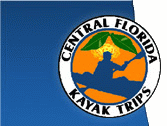
| Blue
Cypress Lake |
 |
| Difficulty: Moderate |
Scenery: Very Good |
Location: Vero Beach,
Indian River County |
Distance: 7 mile
round trip from Middleton's Fish Camp to Moonshine Bay. |
| Atlas: Page 95 C-3 |
| Last Update: May 2003 |
Canoe OK: No |
 Photo-trip
- limited details. Photo-trip
- limited details.
Description
Blue Cypress Lake is a freshwater fishing paradise. It's clean,
protected water is home to many species of fish including large
mouth bass, catfish, crappie (speckled perch), bluegill and chain
pickerel. But the fish aren't the only thing to catch at Blue Cypress.
If you come early in the morning, you'll catch nature-nirvana as
the rising sun casts it's rays upon the lake surface, causing the
cypress trees along the western shore to glow in a bluish hue. And
if that wasn't enough, shutterbugs can catch some delightful photos
as hundreds of osprey families’ nest along the lake's edge.
To start your Blue Cypress Lake adventure, put-in at the boat ramp
at Middleton's Fish Camp. Head under the bridge and out the channel to the
lake. Turning north will take you along the most picturesque part
of the lake, and you'll be sure to see many osprey in the cypress
trees. Within the first mile north of the fish camp, there are several
small creeks feeding the lake. The first one you'll spot is Thum
Creek, followed 1/2 mile later by Blue Cypress Creek. These make
interesting side-trips and an opportunity to explore the cypress
swamps, complete with sub-tropical ferns, alligators and mosquitoes.
At about 2.5 miles, you hit the north end of the lake. Paddling
east for another mile takes you to Moonshine Bay. After a quick
break, and assuming the wind is calm, head southwest for 3 miles
across the lake to Middleton's Fish Camp. You should be able to
see reflections off the cabin roofs to guide you home.
If you still have energy to burn, south of Middleton's the scenery
changes dramatically with Kissimmee grass replacing the cypress
trees. At 2 miles south, you'll come to Fisher Creek and a small
canal.
Access
From the intersection of SR 60 and I-95 in Vero Beach, go west
on SR 60 for 18 miles. Turn north (right) at Blue Cypress Lake sign.
The sign is small and easy to miss, so watch closely for it on the
right side of the road. Follow the well-maintained dirt road for
4.5 miles to Middleton's Fish Camp. Put-in at the boat ramp located
immediate adjacent to the fish camp.
Blue Cypress Lake Photographs
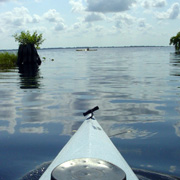
|
Blue Cypress Lake
Blue Cypress Lake is over 6,500 acres in size, 21 miles in circumference, and has an average depth of 8 feet. The lake's name comes from the blue appearance of the cypress trees as the morning sun's rays reflect off the water.
|
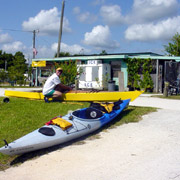
|
Middleton's Fish Camp
Middleton's Fish
Camp is the only fish camp on Blue Cypress Lake. The camp
offers cabins, free primitive (tent) camping, kayak and boat
rentals, bait shop, ice, drinks and snack food. A boat ramp,
dock, picnic area and restrooms are adjacent at the Lakefront
Park. |
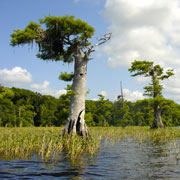
|
Bald Cypress Trees
Taxodium distichum
With a name like Blue Cypress Lake, you'd expect to find the reddish-brown and green trees painted blue.
While they are definitely not blue, these irregular shaped members of the cypress family grow up to 130 feet tall and have enlarged trunks at the base and conical "knees".
|
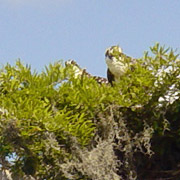
|
Osprey
Pandion haliaetus
You'll find plenty of these large, fish-eating members of the hawk and eagle family at Blue Cypress Lake. Osprey are frequently confused with the Bald Eagle due to its white head. A full-sized adult has a body length of 23 inches with a wing span of over 5 feet.
|
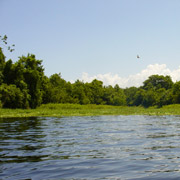
|
Moonshine Bay
Our paddle trip takes us to the very north end of the lake at Moonshine Bay.
This small cove makes a good place to get out of the wind, but unfortunately is surrounded by marsh and does not offer any place to land.
Expect to see a few gators hanging out in the lily pads at the back end of the bay.
|
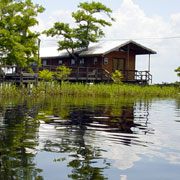
|
Blue Cypress Village
Located next to Middleton's on the west side of the lake, Blue Cypress Village
is the only development in the area. Constructed of mostly cabins,
mobile homes and a few stilt-houses, these weekend get-aways
serve as base camp for big bass seekers and those seeking to
escape the congestion of the coasts. |
References
Alden, P., Cech, R., Nelson, G. (1998) National Audubon Society
Field Guide to Florida, Chanticleer Press, Inc., New York, NY
|

